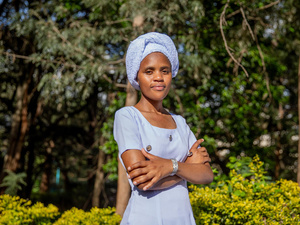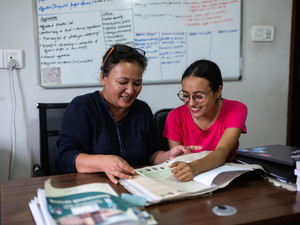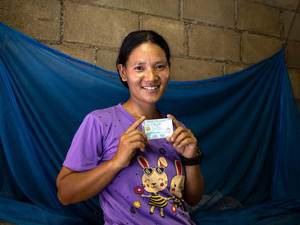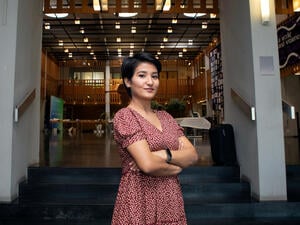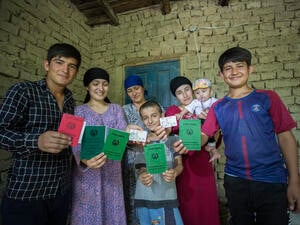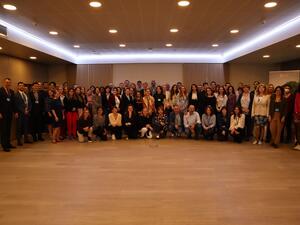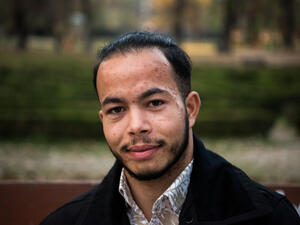UNHCR chief hails landmark conference for making "quantum leap" on statelessness
UNHCR chief hails landmark conference for making "quantum leap" on statelessness

High Commissioner António Guterres gives a press conference after the close of the ministerial conference in Geneva today.
GENEVA, December 8 (UNHCR) - UN High Commissioner for Refugees António Guterres on Thursday wrapped up the largest ministerial meeting of its kind after hailing participating states for making a "quantum leap" forward at the Geneva gathering on the issue of statelessness.
"Where I believe there was a real breakthrough, a quantum leap, was in relation to the protection of stateless people," he said in a closing address to representatives from almost 150 states, including more than 70 at ministerial level.
"I believe we are making a giant step forward," Guterres said, after noting that eight countries had ratified and deposited their instruments of accession to one or other of the two UN statelessness conventions this year and that a further 20 countries had made commitments at the ministerial meeting in relation to ratification of the conventions. "And not only that, 25 other states made pledges in order to improve the protection of stateless people. I think that now we have a duty to profit from this momentum, "he added.
"Statelessness is one of the most forgotten areas of the global human rights agenda. To be honest, statelessness has been kind of a stepchild of UNHCR's mandate. The number of countries that have ratified the statelessness conventions is out of proportion to the number of countries that have ratified the 1951 [Refugee] Convention and its [1967] Protocol," he said.
By some estimates statelessness affects up to 12 million people, a number not far short of the total for the world's 15.4 million refugees. But the 1954 Convention relating to the Status of Stateless Persons and the 1961 Convention on the Reduction of Statelessness have long been under-supported. As of the start of 2011, the 1954 Convention had only 65 states parties, and the 1961 Convention had just 37. There are 193 member states in the United Nations.
High Commissioner Guterres also hailed the "absolutely remarkable" number of pledges made at the two-day gathering by more than 60 states on a wide range of issues to help forcibly displaced and stateless people. He also commended states for adopting a Ministerial Communiqué reaffirming the fundamentals of the international protection regime and of the refugee and statelessness conventions. "The communiqué also points to the future and encourages us to work further collaboratively on protection gaps and the challenges of the 21st Century," said UNHCR Director of International Protection Volker Türk.
Guterres said UNHCR would report on progress made in relation to what was pledged during the conference and stressed that pledges could be sent to the refugee agency until the end of January. The pledges relate to a wide range of issues, including statelessness, sexual and gender-based violence, strengthening of national asylum institutions, resettlement, protection of women and children, improving national refugee legislation, voluntary repatriation, combatting racism, climate change, alternatives to detention, and integration.
Earlier in the day, former Finnish President Martti Ahtisaari urged delegations to do more to resolve the plight of the forcibly displaced and stateless. "Almost all refugee situations are caused by humans. They can and must be solved by humans, by us, by our leaders, by the international community," said the Nobel peace laureate, who in 1939 was forced to flee his own hometown of Viiipuri (now Vyborg in the Russian Federation) at the age of two.
"Let us recommit ourselves to seeking lasting solutions to conflicts. Let us see refugees as part of the solution, not part of the problem. Let us involve refugees in peace processes," he said in a keynote address at the conference, which also celebrated the 60th anniversary of the UN Refugee Convention and the 50th anniversary of the Convention on the Reduction of Statelessness.
"The conventions are crucial instruments to safeguard the fundamental rights of refugees and provide standards for their treatment," said Ahtisaari. These legal treaties enable UNHCR to provide protection and assistance to millions of people worldwide.
Swiss President Micheline Calmy-Rey, meanwhile, announced that her country would from next year increase its support for the work of UNHCR and continue to co-sponsor the annual Nansen Refugee Award, which this year was won by the Society for Humanitarian Solidarity for its life-saving work helping refugees and migrants on the Yemeni coast.
The conference is the culmination of political and diplomatic efforts over many years by UNHCR to rally renewed support and commitments for the fundamental legal treaties that enable the agency to operate.

